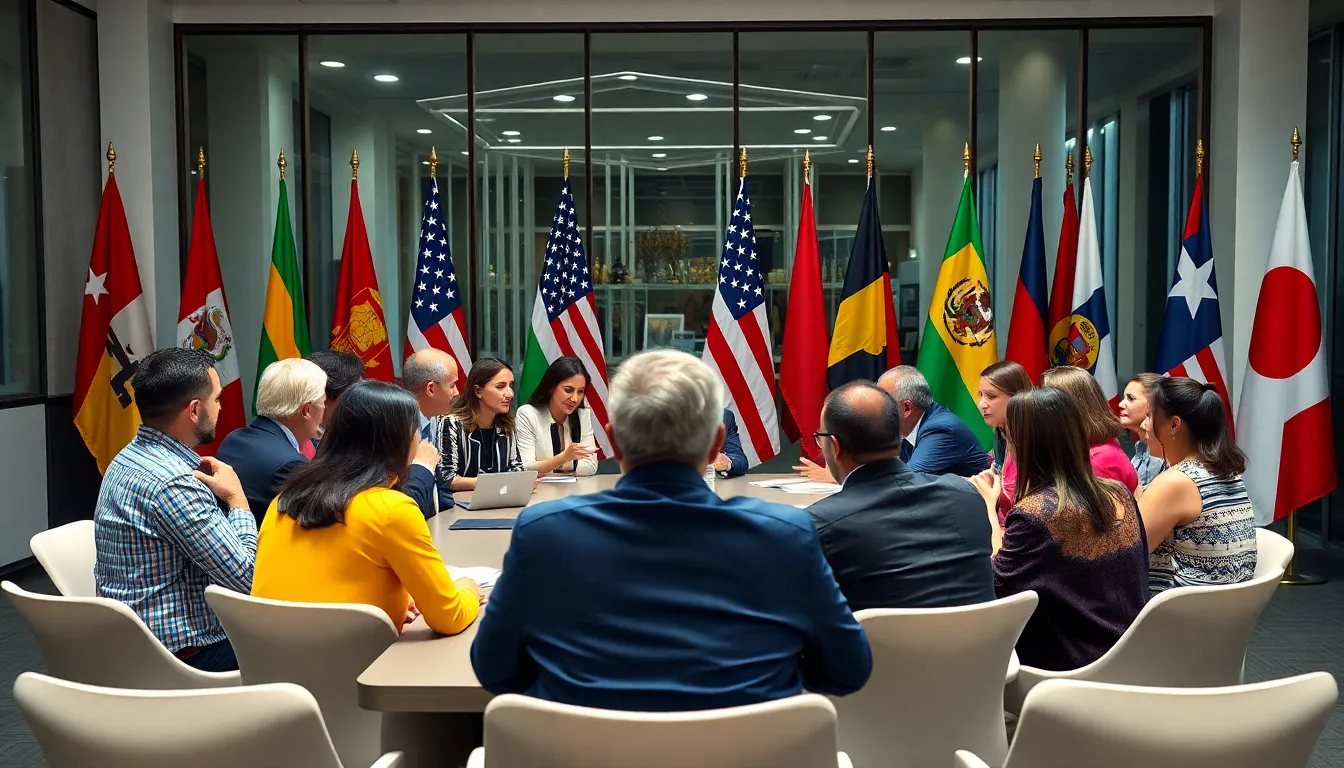Table of Contents
ToggleIn an increasingly interconnected world, understanding global events is more crucial than ever. World affairs shape economies, influence cultures, and impact international relations. As nations navigate complex challenges—from political upheavals to climate change—analyzing these dynamics offers valuable insights into the forces driving our global society.
World affairs analysis delves into the intricate web of relationships and events that define our times. It helps individuals and organizations alike make informed decisions, whether in business, diplomacy, or personal life. By examining trends and patterns, one can better grasp the implications of current events and anticipate future developments. This exploration not only enhances awareness but also fosters a deeper appreciation for the diverse perspectives that shape our world.
Understanding World Affairs Analysis
World affairs analysis examines the interactions between nations, cultures, and economies, leading to a deeper understanding of global dynamics. This analysis shapes informed decision-making in various sectors.
Importance of World Affairs Analysis
World affairs analysis is crucial for comprehending the complexities of global interactions. It helps individuals and organizations anticipate shifts in trade policies, security strategies, and diplomatic relations. By analyzing international events, stakeholders can identify emerging issues, such as human rights concerns or environmental changes. Understanding these matters fosters critical thinking and adaptability, essential for thriving in an increasingly interconnected world.
Key Components of World Affairs Analysis
- Political Structures: Political systems and governance models influence a nation’s stability and decision-making processes. Understanding these structures reveals power dynamics and potential conflicts.
- Economic Indicators: Economic data, including GDP, unemployment rates, and trade balances, provide insight into national and global economic health. These indicators are vital for predicting market trends and investment opportunities.
- Cultural Contexts: Cultural factors, such as religion, ethnicity, and historical experiences, shape national identities and public opinions. Recognizing these influences aids in understanding societal responses to global events.
- International Relations: Diplomatic relations between countries determine alliances and hostilities. Analyzing treaties, trade agreements, and conflicts allows for a clearer picture of global cooperation and tension.
- Environmental Factors: Climate change and resource management significantly impact global stability. Monitoring environmental policies helps assess risks and opportunities associated with sustainability.
- Media Influence: The role of media in shaping public perceptions and narratives about world events cannot be overstated. Analyzing media coverage exposes biases and highlights varying viewpoints in global discussions.
Trends in Global Politics

Global politics evolves continuously in response to various factors, including economic challenges, social movements, and technological advancements. Key trends currently shaping the political landscape include the rise of nationalism and the role of international organizations.
Rise of Nationalism
Nationalism has gained traction across multiple regions, characterized by a strong emphasis on national sovereignty, identity, and culture. Many countries experience a shift toward protectionist policies, prioritizing domestic industries over global cooperation. For instance, nationalist movements in Europe, such as those seen in Hungary and Poland, advocate for stricter immigration controls and reinterpretation of EU regulations. This resurgence often leads to tensions within international alliances and undermines collaborative efforts to address global issues, like climate change and public health.
The Role of International Organizations
International organizations play a critical role in facilitating cooperation among nations, particularly amid rising nationalism. Groups like the United Nations (UN) and the World Trade Organization (WTO) promote dialogue and collaboration on pressing global challenges. The UN, focusing on peacekeeping and humanitarian assistance, tackles conflicts in various regions, while the WTO regulates international trade to promote economic stability. However, the effectiveness of these organizations sometimes faces scrutiny as member states exhibit unilateral tendencies, showcasing a complex relationship between national interests and collective action efforts.
Economic Impacts on Global Relations
Understanding economic impacts is crucial for analyzing global relations. Economic interactions shape diplomatic ties, influencing the behavior of nations in various contexts.
Trade Agreements and Disputes
Trade agreements serve as essential mechanisms for fostering international cooperation. They set specific terms for trading goods and services, allowing nations to benefit from comparative advantages. Recent examples include the United States-Mexico-Canada Agreement (USMCA) and the Regional Comprehensive Economic Partnership (RCEP). Such agreements aim to enhance market access, reduce tariffs, and streamline regulatory processes.
However, trade disputes often arise when nations perceive unfair practices. For instance, the ongoing trade tensions between the United States and China highlight the complexities of international trade. These disputes can lead to retaliatory tariffs, impacting domestic markets and global supply chains. The resolution of trade disagreements is vital for maintaining stable economic relationships and ensuring continued cooperation among nations.
Economic Sanctions and Their Consequences
Economic sanctions represent a significant tool in international relations, utilized to influence a nation’s behavior without direct military intervention. Countries frequently impose sanctions in response to actions such as human rights violations, aggression, or nuclear proliferation. For example, sanctions placed on Russia due to its actions in Ukraine illustrate how economic measures seek to deter undesired behavior.
The consequences of sanctions can be profound. Targeted nations often face economic isolation, which can lead to decreased trade, currency devaluation, and increased inflation. Additionally, sanctions may inadvertently harm civilian populations. As nations evaluate the effectiveness of sanctions, they must consider the potential for humanitarian consequences alongside their strategic objectives. The broader impact of these sanctions can reshape alliances, as countries weigh their economic interests against political pressures.
Social Issues Influencing World Affairs
Social issues significantly shape global affairs, affecting political stability, economic trends, and international cooperation. Migration, refugee crises, and climate change represent pivotal challenges that nations navigate today.
Migration and Refugee Crises
Migration patterns and refugee crises impact global stability and relations. In 2021, the United Nations reported approximately 26.6 million refugees worldwide, primarily due to conflicts and persecution. Countries experience demographic shifts, workforce changes, and cultural diversity as refugees settle in host nations. For example, the influx of Syrian refugees into Europe reshaped political landscapes and triggered debates on immigration policies.
These issues prompt negotiations among nations on asylum laws, border control, and humanitarian aid. When countries adopt restrictive measures, tensions can rise, creating societal divides. Notably, the challenges of integrating refugees into local communities require targeted policies, including education and employment support, to foster social cohesion and economic contributions.
Impact of Climate Change
Climate change poses a multifaceted threat to global affairs. Its effects are evident in extreme weather events, rising sea levels, and shifting agricultural patterns. According to the Intergovernmental Panel on Climate Change (IPCC), climate-related disasters displaced 23 million people in 2020 alone. Nations face pressures to adapt and mitigate climate impacts, influencing international negotiations, particularly during events like the COP climate conferences.
Adaptation efforts necessitate collaboration, with countries rallying to implement sustainability initiatives and transition to renewable energy sources. Climate change also exacerbates resource scarcity, leading to conflict over water and food supplies, especially in vulnerable regions. Consequently, addressing climate change is not only an environmental challenge but also a critical social issue influencing world affairs, demanding collective action from global leaders.
Navigating the complexities of world affairs is essential for understanding today’s global landscape. The interplay of political, economic, and social factors shapes not only individual nations but also the international community as a whole. As challenges like nationalism and climate change emerge, staying informed becomes increasingly vital.
The insights gained from world affairs analysis empower individuals and organizations to make strategic decisions. By recognizing the dynamics at play, stakeholders can better anticipate shifts in global relations and contribute to meaningful dialogue. Ultimately, fostering awareness of these interconnected issues enhances the ability to respond to the challenges that define our world.





